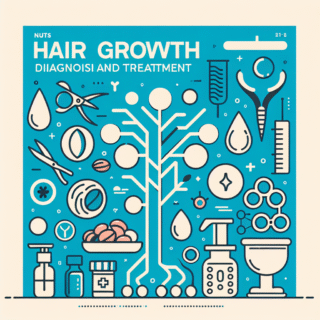
More Allergy, Asthma & Infectious Disease Articles
Nuts Hair Growth: Diagnosis and Treatment Options

Nuts hair growth is a topic that draws attention from people looking for natural ways to support thicker, healthier hair. Nuts are nutrient-dense foods that supply healthy fats, protein, minerals and vitamins—all elements involved in hair follicle health. This article explains common diagnostic clues when hair changes may relate to diet, reviews evidence around nut consumption (with attention to brazil nuts and hair growth), and outlines safe treatment and dietary strategies you can discuss with a clinician.
Nuts and hair growth: what the science says
Healthy hair depends on multiple factors: genetics, hormones, medical conditions, and nutrient status. Observational studies and nutritional research suggest that deficiencies in iron, biotin, vitamin D, and selenium can contribute to hair thinning or breakage. Nuts can contribute beneficial nutrients—especially selenium, zinc, and essential fatty acids—but they are not a cure-all. Understanding the underlying diagnosis is the first step before relying on dietary changes alone.
How clinicians diagnose nutrition-related hair problems
When someone notices sudden shedding, patchy loss, or diffuse thinning, a clinician will take a detailed history and perform a scalp and hair examination. Important clues include the pattern of loss, recent illnesses or stress, medication use, and dietary habits. Simple lab tests—complete blood count, thyroid function tests, ferritin, and sometimes nutrient panels—help identify deficiencies that might be addressed with diet or supplements. If an underlying autoimmune or hormonal issue is suspected, more specialized testing may follow.
Which nuts help hair health and why
Nuts provide a mix of protein, healthy fats (omega-3 and omega-6), vitamin E, zinc, and selenium—nutrients linked to hair structure and scalp health. For example, walnuts are high in omega-3s that may support scalp circulation, almonds supply vitamin E and biotin precursors, and Brazil nuts are among the richest dietary sources of selenium. The U.S. Office of Dietary Supplements provides an evidence-based overview of selenium’s role in the body and recommended intakes, which helps frame how limited, controlled consumption of brazil nuts for hair growth might be used safely: https://ods.od.nih.gov/factsheets/Selenium-Consumer/
Brazil nuts: benefits, risks, and practical use
Conversations about brazil nuts hair growth often highlight selenium. Just one or two Brazil nuts can provide more than the daily selenium requirement for most adults, which may support antioxidant defenses in the scalp. However, excess selenium can cause toxicity, producing symptoms like gastrointestinal upset, hair loss, and nail changes. That’s why brazil nuts for hair growth should be consumed in moderation and not taken as an unchecked high-dose strategy.
Dietary and therapeutic approaches
Treatment plans depend on diagnosis. If tests reveal iron deficiency or low ferritin, iron replacement may be recommended. In cases of androgenetic alopecia (pattern hair loss), topical minoxidil or prescription medications could be appropriate. For suspected nutrient insufficiency, incorporating a variety of nuts—rather than relying on a single type—helps balance intake of selenium, zinc, vitamin E and healthy fats. A balanced approach might include almonds, walnuts, and just one Brazil nut or two a few times per week rather than daily overconsumption.
Food safety is also important; improperly stored nuts can harbor microbes. For guidance on preventing foodborne illness and safe handling, consider reviewing best practices on avoiding contamination and foodborne pathogens in food items.
If you want more on how infections happen and tips for avoiding them—information that applies to safe food handling and storage—see this article on preventing Salmonella infections for practical advice: how to avoid Salmonella infections.
When to see a specialist
Seek dermatology or medical evaluation if hair loss is rapid, patchy, associated with scalp inflammation, or accompanied by other systemic symptoms (weight changes, fatigue, skin or nail changes). A specialist can determine whether lab abnormalities are present, perform scalp biopsy if needed, and tailor treatments—dietary, topical, or systemic—based on a confirmed diagnosis.
- Moderation matters: a small number of Brazil nuts can supply selenium, but excess can be harmful.
- Variety is beneficial: include a range of nuts to cover multiple nutrients rather than relying on one type.
- Confirm deficiencies: testing for iron, thyroid function, and other nutrients should precede high-dose supplementation.
Q: Can eating nuts alone reverse hair loss?
A: No. While nuts can provide nutrients that support hair health, reversing hair loss depends on the underlying cause. Nutritional support can help when deficiency is present, but genetic, hormonal, or autoimmune causes typically need targeted medical treatment.
Q: How many Brazil nuts are safe to eat for hair benefits?
A: Because Brazil nuts are very high in selenium, typically one to two nuts a few times per week is enough for most adults. Regularly consuming large numbers risks selenium toxicity. Discuss personal recommendations with a healthcare provider, especially if you take supplements that contain selenium.
Q: Are there risks to combining nut intake with supplements?
A: Yes. Combining high-selenium foods with selenium-containing supplements can lead to excessive intake. Always review supplements and dietary sources with your clinician to avoid interactions and overdosing.
Other Articles You May Find of Interest...
- Mastering ANC Calculation: A Complete Guide to Understanding Absolute Neutrophil Count
- Is Quantiferon TB Gold Plus the Key to Accurate Tuberculosis Screening?
- Mottled Skin: Causes, Symptoms, and Treatment Options Explained
- Understanding Petechie: Causes, Symptoms, and Treatment Options for Better Health
- What Does an Orange Tongue Indicate About Your Health?
- Maximizing Lung Health: The Importance of Minute Ventilation Explained
- Navigating the Challenges of Nightshade Allergy and Its Impact on Health














